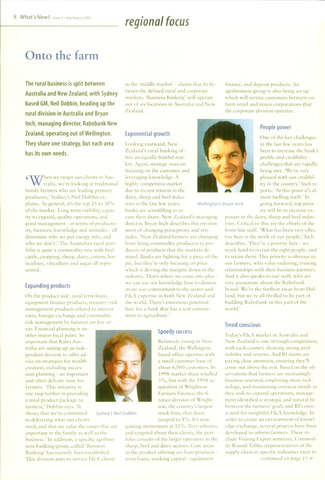regional focus
Onto the farm
The rural business is split between
Australia and New Zealand, with Sydney
based GM, Neil Dobbin, heading up the
rural division in Australia and Bryan
Inch, managing director, Rabobank New
Zealand, operating out of Wellington.
They share one strategy, but each area
has its own needs.
Expanding products
Exponential growth
Speedy success
People power
Trend conscious
8 What'sNewS Issue 4 July/August 2001
CXATThen we target our clients in Aus-
W tralia, we're looking at traditional
family farmers who are leading primary
producers,' Sydney's Neil Dobbin ex-
plains. 'In general, it's the top 25 to 30%
of the market. Long-term viability, capac-
ity to expand, quality operations, and
good management - in terms of productiv-
ity, finances, knowledge and attitudes - all
determine who we put energy into, and
who we don't.' The Australian rural port
folio is quite a commodity mix with beef
cattle, cropping, sheep, dairy, cotton, hor-
ticulture, viticulture and sugar all repre-
sented.
On the product side, rural term loans,
equipment finance products, treasury (risk
management products related to interest
rates, foreign exchange and commodity
risk management by futures) are key ar-
eas. Financial planning is an-
other major focal point. So
important that Rabo Aus
tralia are setting up an inde
pendent division to offer ad-
vice on strategies for wealth
creation, including succes
sion planning - an important
and often delicate issue for
farmers. 'This initiative is
one step further in providing
a total product package to
farmers,' Dobbin says. 'It
shows that we're committed
to delivering what our clients
need, and that we value the issues that are
important to the family as well as the
business.' In addition, a specific agribusi-
ness-banking group, called 'Business
Banking' has recently been established.
This division aints to service F&A clients
Sydney's Neil Dobbin
in the 'middle market' - clients that fit be
tween the defined rural and corporate
markets. 'Business Banking' will operate
out of six locations in Australia and New
Zealand.
Looking eastward, New
Zealand's rural banking of
fers an equally fruitful mar
ket. Again, strategy rests on
focusing on the customer and
leveraging knowledge. A
highly competitive market
due to record returns in the
dairy, sheep and beef indus
tries in the last few years,
banks are scrambling to se
cure their share. New Zealand's managing
director, Bryan Inch describes this environ
ment of changing perceptions and atti
tudes. 'New Zealand farmers are changing
from being commodity producers to pro
ducers of products that the markets de-
mand. Banks are fighting for a piece of the
pie, but they're only focusing on price
which is driving the margins down in the
industry. That's where we come into play -
we can use our knowledge base to demon-
strate our commitment to the sector and
F&A expertise in both New Zealand and
the world. There's enormous potential
here for a bank that has a real commit
ment to agriculture.'
Relatively young in New
Zealand, the Wellington-
based office operates with
a small customer base of
about 6,000 customers. In
1998 market share totalled
3%, but with the 1998 ac-
quisition of Wrightson
Farmers Finance, the fi
nance division of Wright
son, the country's largest
stock firm, that share
jumped to 8%. It's now
gaining momentum at 12%. Very selective
and targeted about their clients, the port
folio consists of the larger operators in the
sheep, beef and dairy sectors. Core areas
in the product offering are loan products -
term loans, working capital - equipment
Wellington's Bryan Inch
finance, and deposit products. An
agribusiness group is also being set-up
which will service customers between on-
farm retail and major corporations that
the corporate division operates.
One of the key challenges
in the last few years has
been to increase the bank's
profile and credibility -
challenges that are rapidly
being met. 'We're very
pleased with our credibil
ity in the country,' Inch re-
ports. 'At this point it's al-
most fuelling itself.' In
going forward, top prior-
ity will be to increase ex-
posure in the dairy, sheep and beef indus
tries. Critical to this are the efforts of the
front-line staff. 'What has been very effec-
tive here is the work of our people,' Inch
describes. 'They're a priority here - we
work hard to recruit the right people, and
to retain them. This priority is obvious to
our farmers, who value enduring, trusting
relationships with their business partners.
And it also speaks to our staff, who are
very passionate about the Rabobank
brand. We're the furthest away from Hol
land, but we're all thrilled to be part of
building Rabobank in this part of the
world.'
Today's F&A market in Australia and
New Zealand is one of tough competition,
with each country showing strong prof-
itability and returns. And RI teams are
paying close attention, ensuring they'11
come out above the rest. Based on the ob-
servations that farmers are increasingly
business oriented, entploying more tech-
nology, and monitoring overseas trends as
they seek to expand operations, manage
ment identified a strategie and natural fit
between the farmers' goals and RI's own -
a need for insightful F&A knowledge. In
order to create an environment of knowl-
edge-exchange, several projects have been
developed to inform farmers. These in-
clude Visiting Expert seminars, Commod
ity Round Tables (representatives of the
supply chain in specific industries meet to
continued on page 11

